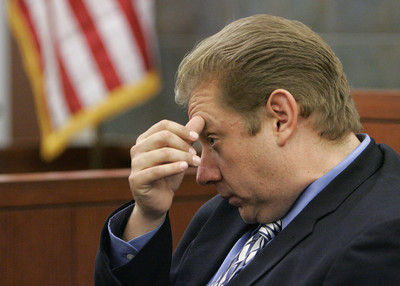Scrutiny remains on guns
Minutes after leading a raid on a hotel room to retrieve his memorabilia, O.J. Simpson left a voice mail for Thomas Riccio saying he hadn't seen anyone use a gun.
Later that night, while Las Vegas police were still in the room investigating, Simpson again called Riccio about the gun issue.
"He said, 'Don't say there was a gun because there was no gun.' That's when I told him I saw a gun," Riccio testified Friday, adding there was a "real good" chance Simpson didn't see the weapon because he was standing several feet in front of the gunman during the Sept. 13 confrontation at the Palace Station.
Riccio's morning testimony wrapped up his turn on the witness stand in the preliminary hearing of Simpson, 60, Charles Ehrlich and Clarence Stewart, both 53, who are charged with robbing two memorabilia dealers at gunpoint. Each man faces 12 criminal counts, including robbery with a deadly weapon, kidnapping and conspiracy.
Three other men involved in the raid have agreed to plead guilty to reduced charges in exchange for their testimony.
After the hearing, which will continue Tuesday, Justice of the Peace Joe M. Bonaventure will decide whether there's enough evidence to send the case to District Court for trial.
Despite the large media gathering outside the courthouse Friday, interest in the hearing seemed to wane.
For the hearing's opening day Thursday, court officials had to raffle off the 15 courtroom seats available to the general public. So few people, including reporters, showed up Friday that seats were handed out to the public on a first-come, first-served basis.
Meanwhile, outside the courthouse there was no sign of the chicken man, the giant bunny on roller skates, the shirtless man wearing a barrel around his waist or any of the other characters who roamed the sidewalks the previous day. They were replaced by two people dressed in black-and-white-striped prison garb, one protesting a local car dealership, the other advertising a bail bonds company.
By the end of the day a few Simpson supporters showed up outside the courthouse to cheer as he departed. His supporters inside the courtroom included his sister, Shirley Baker, and friend Thomas Scotto. Simpson was in Las Vegas the week of the room raid for Scotto's wedding.
During his Friday testimony, Riccio elaborated on earlier statements about the weeks leading up to the incident.
He said memorabilia dealer Alfred Beardsley called him out of the blue in early August to pitch a deal involving stolen Simpson property, including record-breaking game footballs, personalized plaques and family photos.
Beardsley told Riccio the items had been taken from Simpson's house by Mike Gilbert, a former agent, Riccio testified. Beardsley explained that Gilbert had taken the items years ago to hide from sheriff's deputies headed to the house to collect Simpson's property for the $38 million civil judgment against him by the family of murder victim Ron Goldman, Riccio said.
The property was supposed to be returned, but Gilbert kept it, he said.
Riccio said a combination of reasons led him to tell Simpson about the memorabilia and help hatch the plan to get it back. Part of it was doing the right thing, but he also had personal feelings about the people involved and stood to make money in a book-signing deal with Simpson, he said.
"If O.J. was a real jerk to me, I wouldn't have been there," Riccio said. "If Beardsley hadn't been a jerk to me, I wouldn't have been there. If O.J. wasn't doing the book, I'm not in there. You add it all up, I'm there."
Riccio disputed testimony from memorabilia dealer Bruce Fromong, who said Thursday that Simpson and five other men burst into the room in "military invasion fashion" and that one of the men pointed a gun at him.
Riccio said the men walked into the room after he used his key to unlock the door and the situation was under control despite the shouting from Simpson and others.
Fromong seemed to be giving Simpson the memorabilia as Simpson accused him of stealing his memorabilia and trying to sell it, Riccio said.
Fromong "said, 'Mike took it,' not whether he stole it or not," Riccio said. "And he was happy to give it back."
But the situation "went south" after Fromong objected to the men taking his non-Simpson memorabilia, including baseballs signed by Pete Rose and lithographs of NFL hall of famer Joe Montana, Riccio said. Riccio said he didn't see a gun until Fromong's protest, and he said Fromong and Beardsley probably would not have called police if a gun hadn't been involved.
"It wasn't a pleasant experience, but I think everyone could have lived with it until that gun came out," Riccio said.
The first co-defendant to testify was Charles Cashmore, a local laborer who said he didn't even meet Simpson until about an hour before the Palace Station incident.
Cashmore got involved in the plan through Stewart, whom he had known about five years. Stewart had agreed to pay Cashmore $500 to help organize and work the bar at a wedding party at his house that week when he invited Cashmore to the Palms to meet Simpson, Cashmore testified.
Before long Cashmore had been recruited to accompany the others to help get memorabilia. When they reached the hotel, Cashmore and Ehrlich were to go to the room and verify the memorabilia was Simpson's and the meeting wasn't a set-up, Cashmore said.
When the men met Riccio in the lobby, however, Riccio convinced them all to come at once, he said.
Cashmore and Ehrlich entered the room first but were quickly pushed aside by the others. Cashmore said he saw one man waving a gun and another man with a gun near his waist. Cashmore said he felt threatened and complied with orders to stuff footballs and memorabilia into pillow cases and carry it out to a sport-utility vehicle.
During the drive from the hotel, Cashmore overheard Simpson in the SUV on his cell phone saying nobody saw a gun and there weren't any guns, he said.
"It might have been some sort of psychology, reverse psychology," Cashmore said.
During cross-examination, Ehrlich lawyer John Moran Jr. tried to convince Bonaventure that Cashmore had violated the judge's rule against watching the hearing in person or on television. Cashmore had appeared on a national television news show the night before, and his appearance could have tainted the testimony of other witnesses who might have been watching, Moran argued.
After about 10 minutes of arguments, Bonaventure ruled against Moran. The decision prompted a loud sigh from Ehrlich, who slumped his shoulders and said "Oh my God."
Cashmore withstood three hours of aggressive cross-examination from defense lawyers, including Gabriel Grasso, one of Simpson's lawyers.
Grasso suggested Cashmore was a publicity seeker hoping to take financial advantage of his role in the incident.
Cashmore denied having a profit motive and said the ordeal has created nothing but problems. Cashmore said he expects to have trouble finding work. His father refuses to talk to him, and he now has a felony conviction.
"The intent here is to do the right thing and try to get my life back," Cashmore said.
Review-Journal staff writer Henry Brean contributed to this report. Contact reporter Brian Haynes at bhaynes@reviewjournal.com or (702) 383-0281.
O.J. SimpsonMore Information


















